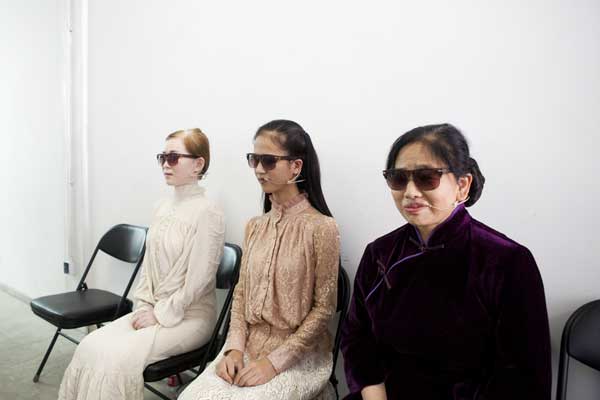

 |
|
Liu Fenglin (right) and other actresses rehearse for The Facial Mould of A Maid by the Seine, a play presented by Xinmu Troupe. Provided to China Daily |
Liu Fenglin, 54, sits onstage behind a desk with two other performers. She reads her lines in a smooth voice full of emotion, wearing a dark purple qipao. With her sunglasses on, no one would guess that she has difficulties seeing.
Liu was at the premiere of The Facial Mould of A Maid by the Seine by Xinmu Troupe in Beijing on Aug 8, the first reading drama in China performed by visually challenged people. The performance will soon be staged in five cities including Shenzhen in Guangdong province and Changsha in Hunan province.
The 90-minute performance is about the famous poet Feng Zhi, who bought the sculpture of a facial mould of an unknown maid by the Seine in the 1930s when he was studying in Germany. He carried the sculpture with him wherever he went, but it was destroyed by the Red Guards during the "cultural revolution"(1966-76).

Feng's poems are recited throughout the play, to demonstrate his life, his concern about his motherland, and his friendship with linguist and historian Ji Xianlin.
The play is organized by Beijing Hongdandan Education and Culture Exchange Center, a nongovernmental organization which aims to improve the quality of life for the visually impaired. The NGO established the troupe to offer more opportunities for those who are passionate about performing arts.
"Times have changed. Visually challenged people can also join social activities, and do many things that others think we can't," says Liu, one of the performers from Changping district, Beijing.
It's not the first time the visually challenged have staged a performance. In 2008, Hongdandan cooperated with theater director Lin Zhaohua to stage The Blind. Two years later, Hongdandan established Xinmu Theater Workshop to promote script writing and poem reading.
"Compared with common people, the visually challenged have better ears. They can judge one's attitude toward them by listening to the person's voice, good or bad, joyful or sad," says Liang Guoqing, director of the play and also a A-list national stage actor.
Liang, together with actress Zheng Zheng, the production director of the play, are both volunteers for Xinmu Theater Workshop.
"In the reading drama, they don't have to walk or express themselves through body language on stage. They only have to recite from their seats," Liang says.
The other reason for choosing the script is that it's sophisticated and popular. It was first performed on stage by Liang and Zheng four years ago.
According to Liang, the script is like a prose. It's perfect for recitation, with little conflict.
All the 11 performers were chosen from public auditions. Dozens of candidates applied and sent their reading clips via the Internet when they heard about it from a radio program specially catered for the visually challenged. The NGO also posted the auditions online.
These performers are not professionals and had to learn everything from scratch. As part of the training, they had to go outdoors at 7 am every day to learn how to breathe and phonate by touching Liang's head, throat and chest.
"Compared with training amateurs, I have to at least quintuple my efforts, as I have to explain and model the screenplay, word by word," Liang says.
One of the biggest difficulties during rehearsals is the lack of confidence among the performers. "The first thing is to let them know that we're all equal. We treat them as artists, and they have the right to receive support and attention from society, and to repay society as artists after the training, " he says.
To encourage them, Liang often snapped his fingers when the performers read very well. Later, as his fingers started to swell, he used a bell instead.
But, Liang has to repeatedly boost their morale. Recently, moral was low, the performers were worried about the upcoming premiere.
"I'm guiding you to climb the Mount Qomolangma (Mount Everest), and we're now at the base camp. I will lead you to the peak at 8,848 meters. I'm like your Sherpa guide, who will never abandon the team members," Liang told them.
According to performer Liu, the teachers taught them with all their heart. "I'm more confident and stronger than before. I also learned how to communicate with other performers and cooperate with them," Liu says.
|
|
|
| Passionate performers |